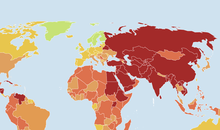
Even after three decades, there is still hope in immigration, a world record in relation to population

Albania has experienced three major waves of emigration. When the country emerged from dictatorship in the early 1990s, it was among the poorest countries in the world. Hopes were high in a small but resource-rich country that was showing endless potential.
Someone found their way through emigration, with the first wave of 1990-2000 seeing the departure of 600-650 thousand people (figure based on natural increase and 1989-2001 Census data).
In a country where the natural increase was 40-60 thousand people per year, this wave had little impact on the total population, which decreased by only 100 thousand people in the first decade after the transition.
Emigration continued, with around 500,000 emigrants in the period 2001-2011, but the natural increase continued to be between 15-20,000 people per year, causing the population to be reduced by around 300,000 people in the second decade of transition.
The third decade of transition found the country in a more favorable position. The country was no longer the same as it was in the early 1990s, local businesses had strengthened, foreign enterprises were showing interest, salaries were increasing, and the process of integration into the European Union was increasingly being discussed.
But, again, the country's development model inspired very little. High corruption, waste of public funds, a weak education system, a health service that forced the highest out-of-pocket payments in Europe, and low salaries that reflected a weak, uncompetitive economy, caused a vital force like that of the youth to flee the country.
Entire middle-class families, whose expectations for life were very different from what reality offered them, also left. In the period 2012-2023, it turns out that about 500,000 people left the country.
But, with natural increase having almost gone to zero in recent years, the population decline was at record levels with 400 thousand fewer people, leaving 2.4 million Albanians.
About 1.6 million people who have fled in three decades, for a population that in 1989 numbered 3.2 million, are a silent protest against a government that failed to inspire hope, encouraging emigration of abnormal proportions.
The latest Eurostat data shows that emigration continues. In 2022-2023 alone, almost 100 thousand emigrants from Albania to European Union countries were registered, while residence permits increased again for the first time in 2022-2023 by over 70 thousand per year.
The pace at which Albanians continue to leave is alarming for a country that has already lost half of its population, setting a record in Europe, even higher than countries where residents flee due to wars and civil conflicts.
Eurostat data for 2023 shows that in relation to population, Albanian citizens were the first to obtain citizenship, with 18.3 per 1,000 inhabitants, much higher than conflict-ridden Syria (4) and Morocco (2.8).
A survey conducted at the end of last year on the "Monitor" website, where over 1,000 people responded, found that Albanians are no longer leaving just for more income, but are looking for a quality of life that they are apparently unable to find in Albania.
Beyond the facade of a country that is rising every day, the respondents, most of whom have higher and postgraduate education, said that the main reason for leaving is the lack of prospects for the future and high living standards./ Monitor
Latest news




Vlora reserves a grand welcome for Sali Berisha
2025-05-03 20:38:35
Couples who sleep in different beds are happier, here's why
2025-05-03 20:20:24


Albanian tries to open plane door during Geneva-Pristina flight
2025-05-03 19:20:19


Noka meeting in Tirana: Vote for PD-ASHM, so that we repopulate Albania
2025-05-03 18:31:03


The mineral massif in Klos collapses, taking a quarry with it
2025-05-03 17:37:21
5 people injured in Laç, crime weapon found
2025-05-03 17:20:43

Two of the injured in Laç in serious condition
2025-05-03 16:40:30
Vučić cuts short US visit, hospitalized in Serbia
2025-05-03 16:22:30
DP-ASHM/Memelli Program: Feasible, economic dignity for every individual
2025-05-03 16:02:07


Details/ Shooting in Laç, names of 5 injured
2025-05-03 15:09:52

Gunfire in Laç, 4 people injured
2025-05-03 14:46:56
Clowns and journalists
2025-05-03 14:31:04



DW: German government rejects Rubio's accusation of
2025-05-03 13:14:49
Trump is protecting American Jews more than any Democrat leader
2025-05-03 13:03:09




The Kosovo Assembly is not constituted even in its tenth session
2025-05-03 11:24:01
Serbian President Cuts Off Visit to US, Vucic Reportedly Ill
2025-05-03 10:53:59
American tourist arrested for killing wife in Shkodra
2025-05-03 10:35:00
Saranda/ 48-year-old man robs store and attempts to rape saleswoman
2025-05-03 10:03:56
Albanian dies in motorcycle accident in Italy
2025-05-03 09:51:11
Will the impasse be broken today? MPs vote for the speaker after nine failures
2025-05-03 09:36:43

Tragic in Italy: 14-year-old Albanian girl jumps from window, dies in hospital
2025-05-03 09:03:04

Economic model, Albania is the European champion in construction
2025-05-03 08:49:07


Morning Post/ In 2 lines: What mattered yesterday in Albania
2025-05-03 08:07:46
The outraged immigrant tells Rama: You have become a national danger
2025-05-02 23:04:43
Kosovo opens embassy in Malaysia
2025-05-02 22:21:37





Analysis: Why is EU-Ukraine trade at risk of becoming less free?
2025-05-02 20:54:39


Refused asylum in Italy, 15 migrants sent to Gjadri camp
2025-05-02 20:30:04
Edi Rama's return to the (losing) 2011 campaign
2025-05-02 20:22:18
Moments of panic in Stuttgart/ Car "runs" into crowd of citizens
2025-05-02 20:02:06


Berisha: Rama travels twice as much as the US president
2025-05-02 19:00:58

Phoebe Gates accidentally reveals that Bill Gates has Asperger's syndrome
2025-05-02 18:45:02


US against "birth tourism": Parents who abuse tourist visas risk entry ban
2025-05-02 18:09:59

Elona Lalaj appointed General Director of Tirana Municipal Police
2025-05-02 17:33:39



Nallbati challenges SP opponents to a public debate in the center of Devoll
2025-05-02 16:53:26
The US withdraws from peace negotiations between Ukraine and Russia.
2025-05-02 16:42:13
Zodiac signs that always know when you're lying to them
2025-05-02 16:27:17


Trump makes changes to his inner circle
2025-05-02 15:56:38
Fire in an apartment on "Tish Daija" street in Tirana
2025-05-02 15:41:27

Who can stop the price increase?
2025-05-02 15:08:52


Trump makes changes to his inner circle
2025-05-02 14:34:04
Theft at Korça hospital, nurse and patient robbed
2025-05-02 14:33:14
Hotolisht residents warn Rama-Balluk: Either us or you
2025-05-02 14:21:58
May 11th Elections, US Embassy in Tirana distributes JD Vance's message
2025-05-02 14:07:14
Germany declares AfD party an extremist group
2025-05-02 13:59:52



Begaj hosts King Abdullah II of Jordan with a state ceremony
2025-05-02 13:10:20

Italian MP: Vote for a great man like Berisha to change your destiny
2025-05-02 12:53:19
Florenc Çapja extradited from Dubai today
2025-05-02 12:39:21
Berisha: Every village will have the infrastructure of city neighborhoods
2025-05-02 12:30:53


